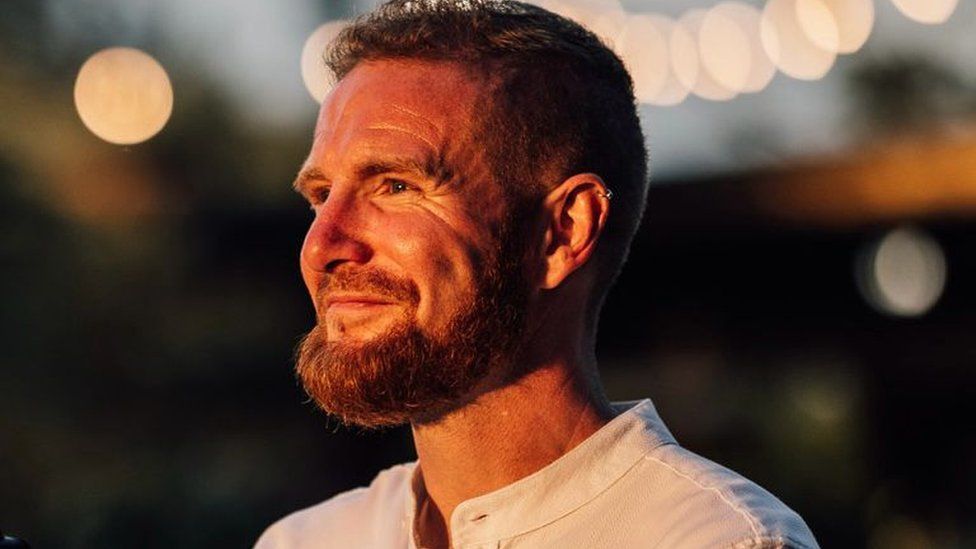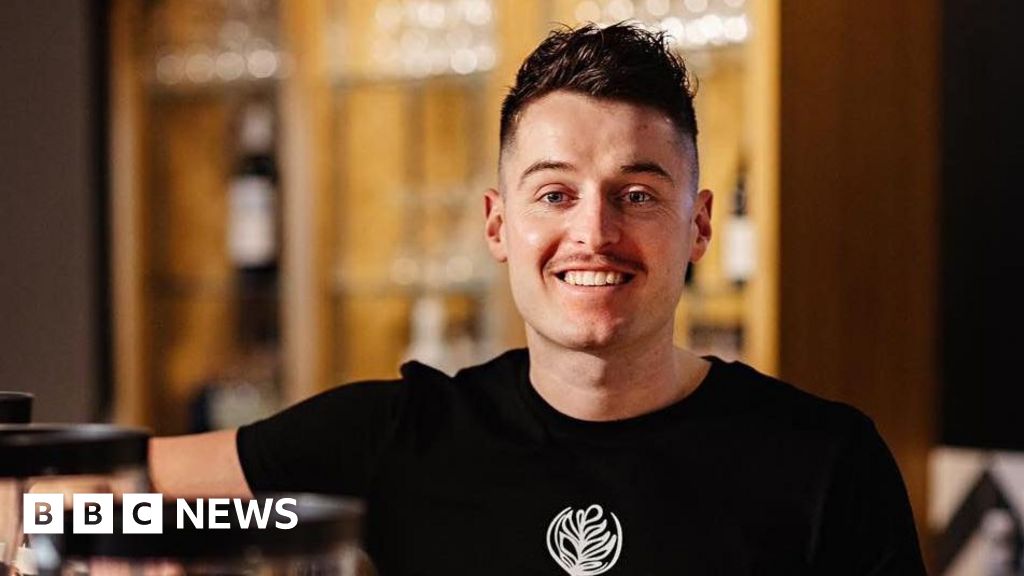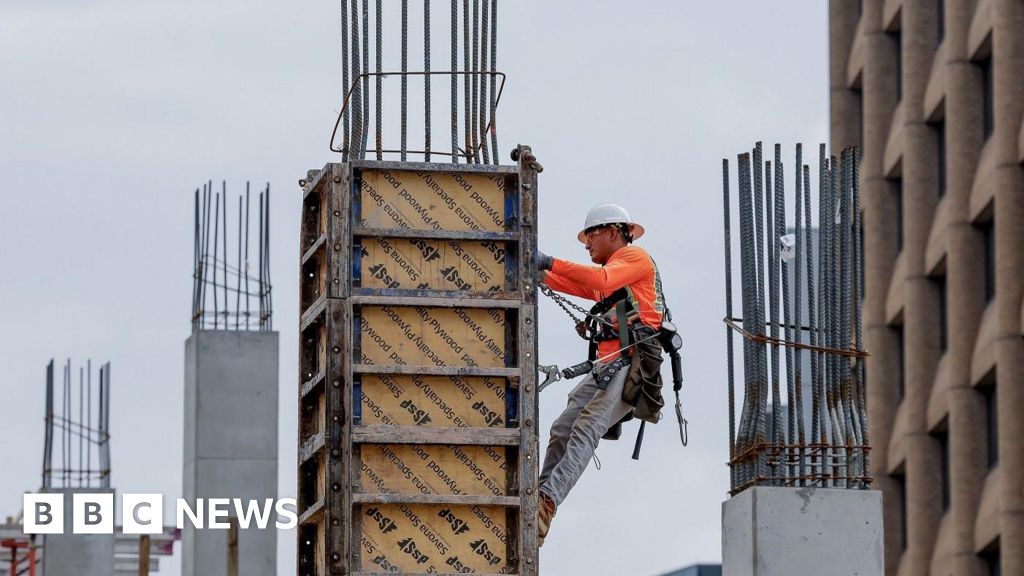ARTICLE AD BOX

Oliver, based in Kent, had £799 taken out of his account by Smile Direct Club just under two weeks ago
By Lora Jones
Business reporter, BBC News
"I'm gutted... it's a fair chunk of money and I feel a bit numb about it really," says Oliver.
The photographer spent £800 with Smile Direct Club just under two weeks ago in the hope of straightening his smile.
After it was announced the remote dentistry firm has shut down, many customers are confused about their treatment and whether or not they will receive the aligners they paid for.
Dentists have also expressed "great concern" for stranded patients.
Oliver told the BBC that he signed up to a special offer from Smile Direct Club when they were offering treatment for £799 instead of the usual £1,800.
It was a limited-time offer for the clear aligners they are best known for, which Oliver says he regrets taking up now.
"My teeth have always been a bit on the wonky side so I thought that this seemed like a great deal as other places were thousands of pounds."
He was asked to travel to the Smile Direct Club site in Essex to have his teeth scanned so the custom-fit set could be made up there so he could redeem the offer in time.
Founded in 2014, the orthodontics company styled itself as a disruptor to the "bricks-and-mortar" dental industry.
In traditional dentistry, "train-track" braces and clear aligners are fitted by dentists and orthodontists themselves, or a trained orthodontic therapist, after an in-person consultation.
Oliver and Teah told the BBC they had only received a tote bag from the company with some leaflets
Many customers were drawn to US-based Smile Direct Club because of lower prices, and the fact that they typically take the moulds for their aligners themselves at home.
For Oliver, the in-person scan was not accurate so he ended up taking the impressions himself later anyway, and received an email just six days ago telling him that his aligners were being made.
But late on Friday, it emerged that a last-minute rescue attempt had failed as the company was weighed down by debt.
In a statement on its website, Smile Direct Club said it had made the "incredibly difficult decision to wind down its global operations".
It says that any orders that have not yet been made or shipped have been cancelled.
Oliver is not hopeful that he will receive his retainers, despite having made the £800 payment in full using his debit card.
"I went cheap, and the whole phrase 'buy cheap buy twice' comes to mind," he said, adding that he was asking his bank for help and wanted to "fight his corner".
On its website, Smile Direct Club apologised for any inconvenience caused and recommended that if customers in the US, UK and elsewhere want to carry on with their treatment, they should get in touch with a local dentist.
There will be more information on refunds, it said, as the bankruptcy process continues and "next steps" are determined.
It has angered some customers, however, by saying that the "lifetime smile guarantee" it previously offered was no longer valid, while those with payment plans set up are expected to continue making payments.
What should Smile Direct Club customers do?
Lisa Webb, consumer law expert at the organisation Which?, said that many customers would feel "adrift" due to the company going bust.
She pointed out that where refunds would be available, they will be handed by liquidators. "But customers will be at the back of a long queue of creditors so this is unlikely to amount to much, if anything at all," she said.
She recommended that anyone in the UK who is still waiting for products, and has not had their order cancelled and paid via credit card, could also try to claim their money back via Section 75 under the Consumer Credit Act.
Teah from the West Midlands told the BBC that she had paid the deposit for her aligners about two weeks ago.
The treatment, which typically takes about four to six months, costs £1,739, which Teah was planning to pay back using the Smile Direct Club payment plan.
But on Saturday, she logged into her account to see if her aligners had been made yet and was met with the statement on its closure.
She said she is feeling "outraged and anxious" due to the fact those on payment plans are being asked to continue to make them.
"It is not right that I [am expected to] pay such a large sum of money even though I didn't receive any treatment or merchandise from them."
The BBC has contacted Smile Direct Club for comment on Oliver and Teah's experiences.
Dental bodies have hit out after it emerged that the company had collapsed months after it filed for Chapter 11 bankruptcy protection in the United States.
The British Dental Association (BDA) said that it had raised concerns about the company offering plastic aligners remotely and the potential risk of misdiagnosis with regulators.
BDA chair Eddie Crouch said: "Dentists are left to pick up the pieces when these providers offer wholly inappropriate treatment.
"It shouldn't take a bankruptcy to protect patients from harm. It requires decent laws and effective regulation."
Image source, Getty Images
Image caption,Treatment with the firm typically takes four to six months
Anjli Patel of the British Orthodontic Society suggested that the firm was avoiding responsibility for customers' treatment in a way that was "nothing short of scandalous".
It is calling on watchdogs in the UK to ensure any firm providing orthodontics directly to patients in the UK are held to high standards.
Ms Patel also urged customers concerned about their treatment or aligners to contact a dentist to discuss their options.
Smile Direct Club vigorously defended its practices throughout and said consistently that customers' treatments are reviewed by licensed professionals, while risks were listed as well.
In the statement on its website, the company said that it has "improved more than two million smiles and lives".
The Nashville-based firm debuted on the Nasdaq stock exchange in 2019 and it was once valued at about $8.9bn (£7bn). But it failed to turn a profit and had nearly $900m worth of debt at the time it filed for bankruptcy, according to Fortune magazine.

 1 year ago
29
1 year ago
29








 English (US) ·
English (US) ·